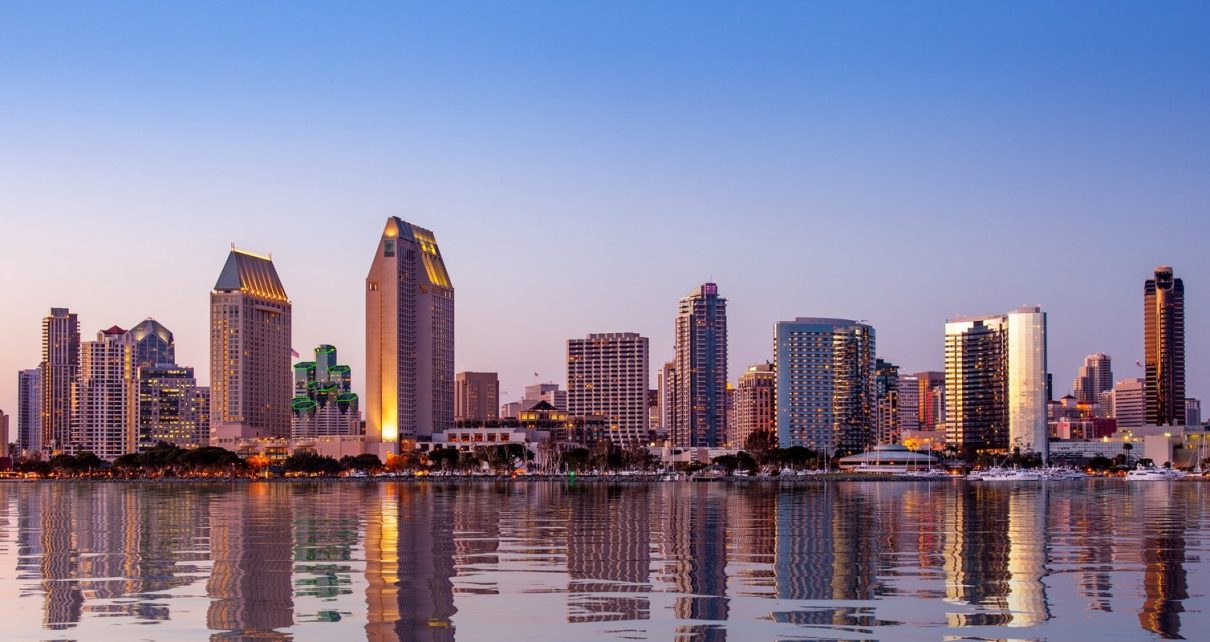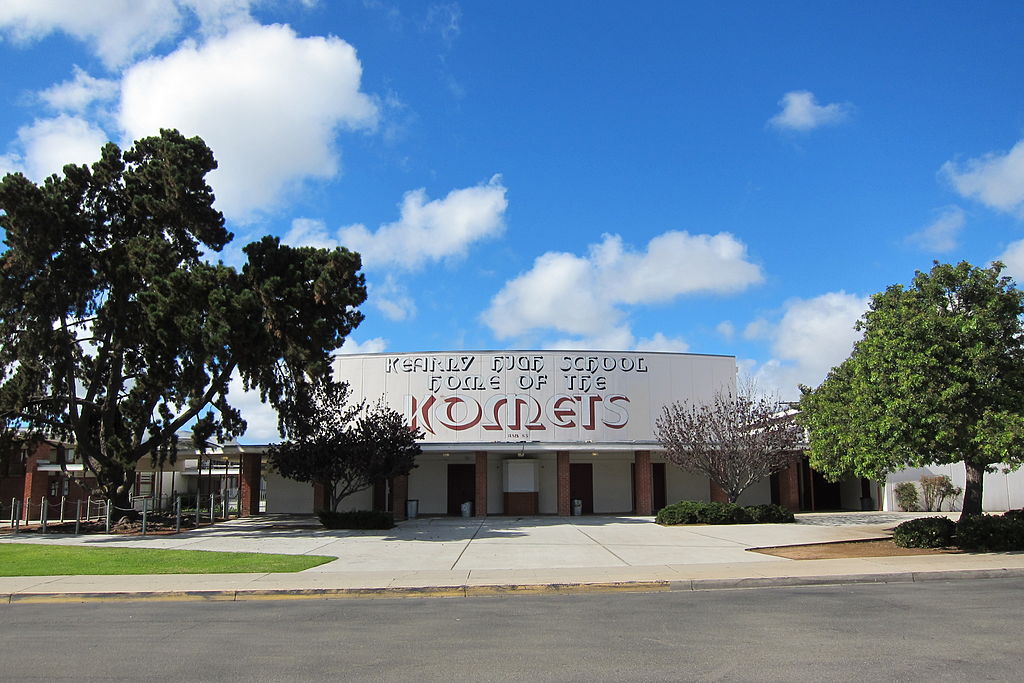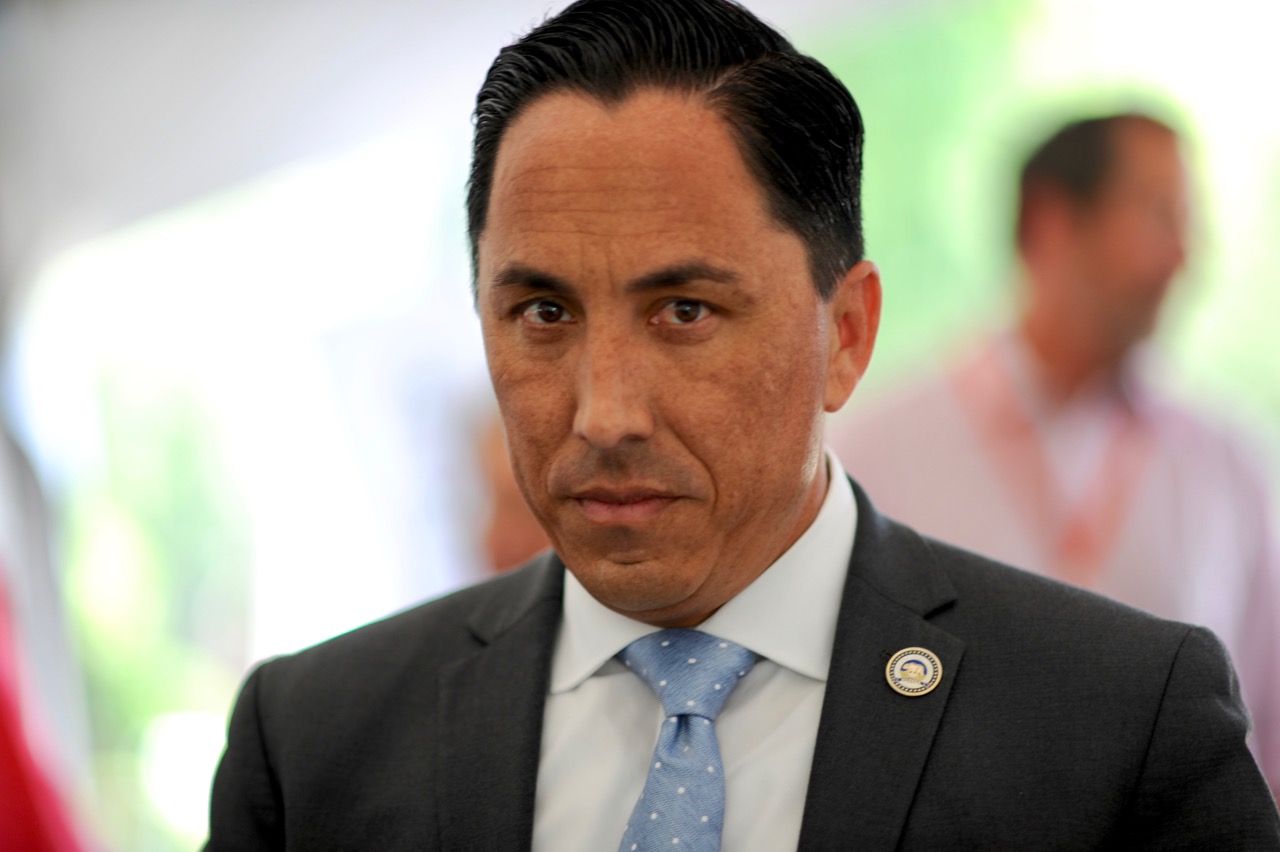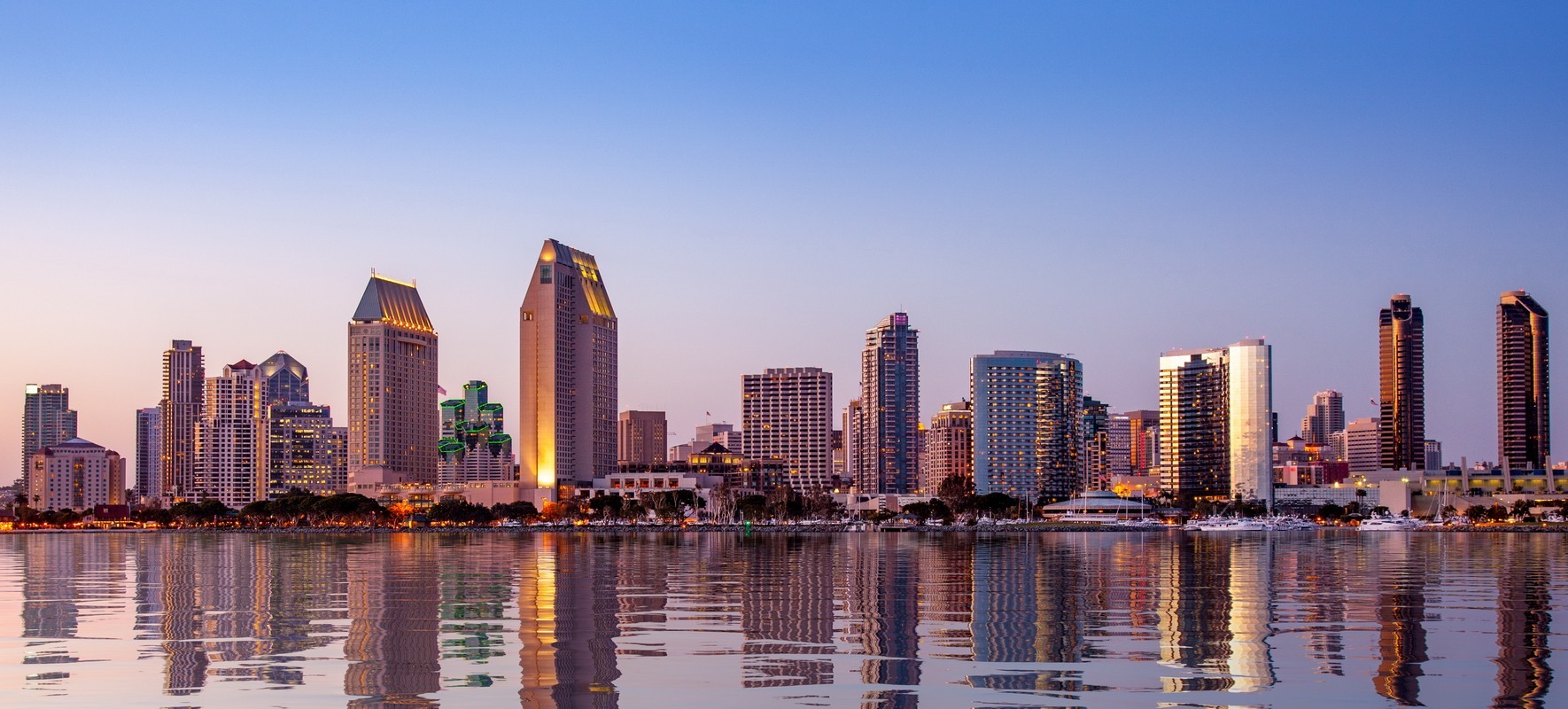
Downtown San Diego. (Photo: City of San Diego website)
San Diego to Hold Public Meeting on Per-Mile-Driving-Tax Proposal
City seeks funding for a 30-year, $160 billion regional plan for free public transportation and 200 mile regional rail network
By Evan Symon, October 27, 2021 11:50 am
A proposal by the San Diego Association of Governments (SANDAG) to institute a 4 cent per mile tax on all drivers by 2030 will be brought forward at a special public meeting on Friday.
Governmental leaders across California, as well as in other states such as Utah and Oregon, have been looking at how to replace the gas tax in the coming decades due to gas-powered cars and other vehicles likely to become far fewer in number. With electric and hybrid cars expected to be the main vehicles on the road, and fuel efficiency already cutting into gas tax revenues by around 75 miles a tank per vehicle in the last few years, a by mile road charge has been proposed to keep funds up to pay for road and infrastructure costs that has been paid for by the gas tax for decades.
At the state level, California has been testing charging around 2 cents per mile in pilot programs, but has run into numerous issues. Most notably, the state has experienced difficulty in how to report by-mile-usage, with people failing to self-report odometer readings, transponders leading to privacy issues, concerns mounting on if mileage should be calculated when driving out-of-state, and numerous other concerns.
However, the pilot program was extended to 2027 last month through the passage of SB 339, with a goal to institute the plan by 2030 – well before the scheduled phase-out of selling new gas-powered vehicles in 2035.
In San Diego, the concern is less on road costs and more on how to fund a 30-year, $160 billion regional plan that would include things such as free public transportation and a 200 mile regional rail network costing upwards of $43 billion.
The largest part of funding SANDAG’s plan would come through charging 4 cents per mile on city roadways, which would contribute around $34 billion by 2050 should the mileage plan be instituted in the city in 2030.
“It’s probably looking more like 2030, so we’ll be making that adjustment in the final plan,” noted SANDAG Chief Economist Ray Major earlier this year.
Although SANDAG hopes to test the program soon with San Diegans 18 and younger, multiple county agencies still need to approve it. San Diego would also need to get past the hurdles plaguing the statewide program, most notably, finding a reliable way to calculate mileage. SANDAG has also had to combat early public outrage at paying so much for public transportation and so little for roadways and car drivers.
“There’s a lot going toward roadways here,” said SANDAG regional planning Director Coleen Clementson earlier this year. “It’s not an all-transit plan by any means.”
Many questions, concerns over by-mile driving fees
However, much of the regional plan is still up in the air, as funding continues to be an issue at SANDAG, with the Transnet sales tax bringing in under $20 billion over 40 years, and proposed sales tax increases bringing in $17 billion over the next 30 years still needing voter approval.
Nonetheless, SANDAG is going ahead with a public meeting on Friday to discuss the mileage tax plan. Experts say that while some sort of mileage plan will take the place of the gas tax in the next few decades at the state level, many remain unsure on if local mileage taxes will work.
“Right now, as states like Utah have found out, there are a lot of ways around reporting mileage,” said Washington-based transit planner Francis Conner to the Globe on Friday. “Congestion charge systems, like in London, have seen a lot of people slip by through various means too. There’s just no real reliable way to measure usage in a smaller area.”
“The four cent per mile fee would also negatively affect companies and people that rely on a lot of driving that public transit could not handle, like going to more remote areas, carrying equipment, carrying larger grocery or shopping purchases, and so much more. You’re basically looking at taxing people who want or need to live in more rural areas more.”
“And it’s not just California – most states are looking into something like this. And San Diego trying to do this to fund a plan that should really go to the taxpayers vote is really going under the radar. The last thing they want is to get comparison to the current high-speed rail project there that has gone so high in cost in recent years.
“I don’t think SANDAG is going about this right. We do need a gas tax replacement. Electric and hybrid cars need to pay their fair share for road usage and repair too. But that’s the state level. They just want to charge people way more. The Department of Transportation has found that the average driver drives 13,500 miles a year. That’s an extra $540 a year. That’s not nothing for a family barely ends meet. That’s a car payment or two a year.
“And this is all going to come up at the meeting.”
SANDAG’s public meeting is to be held on Friday.
- Man Who Broke Into L.A. Mayor’s Home to Receive Probation, Mandatory Drug Treatment - July 25, 2024
- California National Guard Counterdrug Task Force Seizes nearly $4 Million Worth Of Fentanyl In June Following Ramping Up Of Actions - July 24, 2024
- San Francisco’s Guaranteed Income Programs for Trans People to End - July 24, 2024





NOTHING is free when taxpayer funds are used. They pay for it. And why does anyone deserved to have “free” transportation? Why not “free” accounts at grocery stores? Oh yeah, it’s called WIC and SNAP. CA needs to stop overtaxing fuel and using fraudulent clean energy requirements that are uneconomical, and everyone will be able to afford their own transportation.
You only see this kind of tax madness in blue run cities…no wonder people are leaving California in droves.
From the website of South Carolina: “Excise taxes on Fuel are implemented by every state, as are excises on alcohol and tobacco products.”
Thank God or Johova or Muhamad that kids today are having kids because they will pay for ALL THIS FREE money and transportation and college and food…LOL… THIS IS WHY TRUMP PEOPLE ARE BORN….
Agenda 2030.
Ban politicians, or tax them HEAVILY on unrealized violations of liberty.
I’m going to have to start driving my old 2006 Ranger a lot more. The odometer broke years ago.
Electric vehicles might be pushed to come with direct connect report on miles…and control your car usage such as auto-off. I bet down the line there will be a connection to your car about miles tax where if you dont pay they can shut your car down
Comrades
Nothing is cheap for the masses these days, so shake it off, whatever,,,,,,,when they are done…..you’re collectively done…
There are sure a lot of dumb conservatives posting comments here on CA globe. Mostly just rambling
and incoherent statements.
Thankfully we have excellent leaders in CA who can see the future. Fossil fuels are of the past.
A per mileage tax on all cars is a good move that will help the state to collect tax from those who choose to drive.
Having electric vehicles will help reduce emissions and help reverse climate change. But the better option is to use public transportation. You would be helping reverse climate change and would not be paying any driving tax.
Lets hope SD and the state can find a sensible way to implement this idea.
What a stupid statement. Electric vehicles pollute a LOT more than fossil fuels. It’s tough using public transportation while your looking for a job. It will collect a lot of taxes alright, so they can direct the tax money into their retirement funds. I rally don’t believe there is a single excellent leader in the entire state of California. Where in the heck are you going to get all the charging stations and there had better be a lot of them since it takes hours to recharge the batteries. Wait until you take a trip across the state then get a huge tax bill. It is idiots like you that have destroyed the stat of California.
No, it is your statement that is stupid! “Electric vehicles pollute a LOT more then fossil fuels”.
It is ignorant claims like that which make right wingers like you unworthy of being heard.
You also don’t know how to spell “state”.
Are you kidding me? Prematurely ram-rodding electric transportation will hurt the poorest the most. I say institute a per-kilowatt tax on electric vehicles and leave the gas tax alone. Actually, we should be putting most of our efforts into making California more efficient in spending public revenue. What? You don’t think there’s any waste or room for improved efficiency? It’s outrageous that there’s a mad rush to replace gas-tax revenue without first looking for ways to streamline the bloated bureaucracies to get by. Start with phasing out CARB & put their budget into road infrastructure. Why keep them around? Who needs an agency like them if everything is going electric. Besides, federal standards are enough. We get no value added by agencies who sit around dreaming up stuff to (theoretically) make things .001% better all while imposing a huge cost on businesses & taxpayers. Just ask the trucking companies who couldn’t afford engine upgrades or to replace their whole fleets to trucks newer than 2010. Unbeleivable! You’ve really drank the cool-aid. Let’s give more free stuff away, like free passes on the zillion dollar high-speed system for everyone on public assistance!
W16521, we get a few lefties like you on CA Globe and they all have the IQ of a fence post. Global warming, climate change, climate crisis, global cooling, climate emergency or whatever you are calling it this week is the biggest fairy tale since Grimm. I would ask you to go to http://www.climatedepot.com and cfact.org where you can get REAL SCIENTIFIC FACTS on climate. They have countless articles and available books that blow the lid off the climate BS. They have graphs that even lefties can read and understand.
You are going to hear from me because it is right wing websites like CA globe that are constantly putting out false news, misleading headlines, and propaganda.
Hey dummy did you check out the websites I suggested like http://www.climatedepot.com and cfact.org? Check out the graphs. You lefties can understand graphs can’t you? I am trying to educate you.
You are reading and believing things on CA globe. Who is the dummy now?
“Choose to drive”? And you’re calling others “dumb”?
Those in rural areas, the people who are often growing your food, may only shop twice a month. Hard to take public transit from a $600 trip to Costco to 20 miles past the end of public transit. We don’t take unnecessary trips. Don’t go to Starbucks, resturants, and shop frequently, consolidate trips.
Have you taken public transportation lately? In a perfect world it seems ideal but it isn’t physically safe with the homeless accosting for money or harassing other commuters.
Here’s what they are doing. They are proposing a 4 cents per mile driving tax knowing it is way to much. After having a public meeting they will be magnanimous and cut the tax in half and jam it through.
Another tax to go into their pockets.
Your propiska, please.
Of course, that means the taxpayers literally own the roads now. Driving is no longer a privilege but a right.